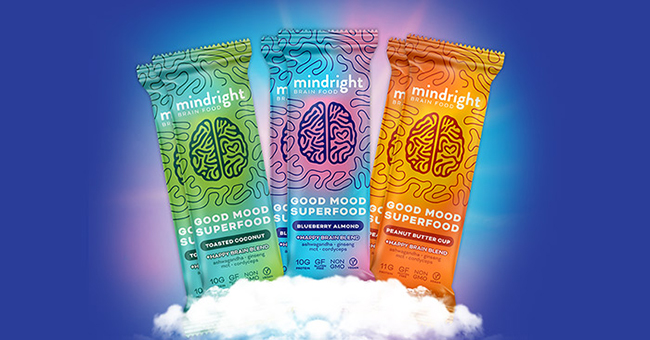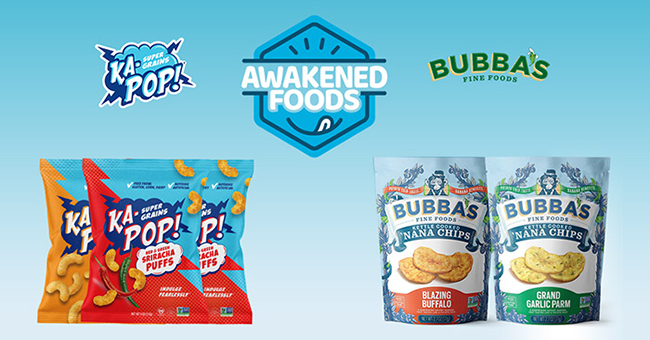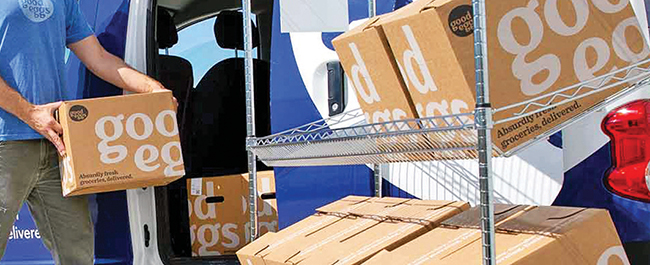NOSHscape: The Latest Food Brand News
Mood Food: Can Mindright Feed a “Happiness Hack?”
Mindright wants consumers to “get in a good mood via superfoods” and now it’s got an even bigger megaphone to do so. The snack brand, which was co-founded by former Buff Bake CEO and investor Chris Bernard and athlete Rob Dyrdek (via his venture studio Dyrdek Machine), announced it had raised $1.8 million from a star studded slate of investors. It’s just one more step in the brand’s quest to help Americans find their happy place.
Dyrdek himself has dabbled in the food and beverage world before, investing and helping create brands including Outstanding Foods, Momentous, Black Feather and Made By Science. The latest capital infusion comes from many of Dyrdek’s contacts including singer Joe Jonas (who now holds a board seat), “The Profit” Marcus Lemonis, musician Travis Barker, skateboarder Sean Malto and other entrepreneurs, athletes, producers and directors. Rather than simply trading equity for endorsement, Dyrdek said this model results in a more authentic partnership — and ultimately, upside for its investors.
“For celebrities, it’s a place to potentially put your capital to get a nice return,” Dyrdek said. “So supporting that with skin in the game, versus doing a relationship with celebrities based just off of their name type of thing.”
The brand launched in February with three bars: Blueberry Almond, Peanut Butter Cup and Toasted Coconut. Each bar contains mood enhancing adaptogens and nootropics (dubbed the “Happy Brain Blend”) including ashwagandha, ginseng, MCT oil, and cordyceps. Currently the line is sold online only with an MSRP of $32.99 per 12 count box.
Bernard said keeping the brand online for at least a year will allow the company to refine the concept while keeping risk low and costs down. In the second half of the year Mindright plans to debut new products, including a powdered beverage line that also contains caffeine.
Though the bar category is crowded, and has seen sales drop during the Covid-19 pandemic, Bernard believes there’s also a lack of innovation in the set, which has largely focused on energy or protein. And while consumers have needed fewer ways to get protein into their diets over the last year, he said, interest in brain health has skyrocketed.
“The reality of it is that basically every bar that came along and found success was at a point when there were too many bars,” Dydrek said. “To the mainstream consumer, nootropics are still a little daunting and clinical sounding.”
Mindright’s branding is both whimsical and weird, offering a general promise of better mental health, without going too far into the science. The brand emphasizes high quality ingredient sources and a short ingredient list while not sacrificing taste, Bernard said. The end result is a website that talks about adaptogens next to tongue in cheek references to pop culture phenomena such as Tiger King. It’s a strategy that Dyrdrek says will allow the brand to stretch and reach more shoppers.
“For me, as someone who has created a lot of brands… it’s this idea of how do you build something that has the foundation of all of the qualities that you would expect, but build it in a way that appeals to a mass audience,” he said. It’s [about] more energy and more fun.”
Colorado-based brands Ka-Pop! Snacks and Bubba’s Fine Foods announced a merger, forming holding company Awakened Foods which will include the two brands as well as a new co-packing division, Awakened Food Crafters.
The deal will allow the two brands, which will continue to operate independently, to leverage their branding, R&D and operational expertise to grow their own businesses while also offering food companies co-packing by experienced CPG leaders familiar with the potential manufacturing pain points, Ka-Pop founder and Awakened Foods CEO Dustin Finkel said.
Ka-Pop, Bubba’s Merge to Form Awakened Foods, Launch Co-Packing Division
Ka-Pop, launched in 2018, markets Ancient Grain Popped Chips and Puffs, while Bubba’s, launched in 2014, offers keto-friendly snacks and granolas. With Finkel in Awakened’s CEO role, Bubba’s founder and CEO Jeff Schmidgall will serve as the company’s COO. Ka-Pop will now manufacture its products at the Loveland, Colorado-based Awakened Food Crafters facility, where Schmidgall has been manufacturing Bubba’s products while also running a smaller scale co-packing and private label business.
“In today’s world of COVID, there’s a challenge in ensuring that you can get the right funding for your business, ensuring stability in manufacturing and ensuring consistent resources,” Finkel said. “This is a huge opportunity for both brands to really accelerate our growth in a way that I think independently would be much more difficult.
The facility already has the ability to manufacture products like granola, nut mixes, cereal, baked goods, puffs, popped chips and other salty snacks, Finkel said, but is also willing to invest in equipment for other product types if the “opportunity is right for both sides,” he said. In addition to co-packing, Awakened Food Crafters also offers R&D support and strategic consulting, he said. To support the growth, the company has hired new staff and added a significant amount of new equipment to the co-packing facility, establishing a separate section of the facility to cater to allergen-free brands.
While the co-packing facility has the capacity to work with larger national brands, Finkel said that he believes it will be a particularly appealing partner for emerging brands looking to innovate quickly. It’s a need the Awakened team feels other co-packers are unable to meet.
“One of the challenges for small brands using co-manufacturing is the lack of flexibility and speed to innovate quickly and do it in a nimble fashion so that they can throw it on the wall and see what sticks online,” Finkel said. “When someone calls and shares their struggles or their issues or their wants and desires, I can approach it from having done this for 15 to 17 years and starting my own company.”
Investment Firms Launch CPG SPAC
AF Ventures has joined the SPAC club.
The CPG venture fund once known as Accel Foods has combined forces with two other firms to launch a publicly traded “blank check” company to target more consumer brands. Together with Scharf Brothers and Mistral Equity Partners, AF Acquisitions initially offered 20 million shares at $10 each, to raise up to $200 million for the initial public offering.
The SPAC will look for an acquisition in the “better-for-you consumer packaged goods industry,” specifically food, beverage, health and wellness, beauty, pet or personal care sectors. The group is particularly interested in “digitally native brands, communities and platforms” that already have strong engagement and loyal customers, but that can be expanded into brick and mortar retailers as well. Targets will also have strong margins, dedicated customers and the ability to prove, through metrics, that there is (and will continue to be) consumer demand for their products.
AF Acquisitions, trading under AFAQU, will be led by CEO Jordan Gaspar, one of the original managing partners at AF Ventures, alongside chairman Andrew Scharf, chief investment officer of family office Scharf Brothers, and CFO Christopher Bradley, a managing director at Mistral Equity Partners. Independent director nominees for AF Acquisitions include Andrew Heyer, CEO of Mistral Equity Partners, Mary Fox, general manager for North America consumer products at BIC and Nola Weinstein, global head of culture at brand experience at Twitter. The firm will be based in Palm Beach, where Scharf Brothers is located.
AF Ventures currently has 30 portfolio companies, including Goodfish, Wandering Bear Coffee, Good Day Chocolate and Kidfresh, with three exits since its inception in 2014. Scharf Brothers, which invested in public and private companies, private equity, hedge funds and real estate, has acquired, owned and operated 21 businesses across a variety of industries. The group has also played a role in two prior SPACs. Finally, Mistral Equity Partners, which invests in consumer, retail, restaurant, media and related technology and services businesses, has sponsored four previous SPACs.
In the filing, the three firms note that they have worked together in the past. Over their history together, Scharf Brothers and Mistral Equity partners have invested in AF Ventures, sat on their investment committee, made co-investments with the fund or served on the board of directors of their portfolio brands. The three decided to launch a SPAC in order to offer companies a new way of obtaining capital beyond the traditional fund model.
“We have decided to pursue this endeavor in order to expand on the vision of our partnership; to provide capital in creative and thoughtful ways to pioneering companies entering the next phase of accelerated growth,” the filing notes.
As listed in the filing, AF Acquisitions is not prohibited from pursuing a transaction with a company that is affiliated with AF Ventures, Scharf Brothers, Mistral Equity Partners or any of the company’s officers or directors
AF would not comment citing SEC regulations.
Good Eggs Closes $100M, Plans for Expansion
It seems like the idea of a fresh-focused retail platform isn’t just a good egg but a golden egg. In February, ecommerce platform Good Eggs announced the close of a $100 million round of capital, an infusion that will help the company expand into a new geographic region, build out assortment and bring on more support for the growing business.
The round was led by Glade Brook Capital Partners, with additional investment by GV (the investment arm of Google), Tao Capital Partners, Finistere Ventures and Rich’s alongside previous investors Benchmark Partners, Index Ventures, S2G, DNS Capital and Obvious Ventures.
The company has raised $170 million since its restructuring in 2015, a move that resulted in CEO Bentley Hall taking the helm.
Founded in 2011, Good Eggs originally focused on delivering produce, meat and other fresh items, expanding from its base in San Francisco to Los Angeles, New York City and New Orleans. After a period of rapid growth, the business was overwhelmed with the complexity of building out supply chains in multiple markets.
Under Hall, the company scaled back to focus on the Bay Area, only expanding further from its headquarters to the East Bay with the opening of a second Oakland facility in early 2020. The company has also expanded its assortment, adding more pantry staples, meal kits, prepared meals and, most recently, alcohol. During his tenure, the company has achieved nine-figure revenues, the company reports, with “meal solutions” accounting for approximately one-fifth of total sales.
Good Eggs opened its Oakland facility last February, just weeks before California was shut down under a shelter-in-place order due to the pandemic. Hall said that while working the kinks out of a new location, which was built from the ground up and used new technology systems, while dealing with a pandemic and increased demand was intense, but ultimately helped prove out the model.
“It just set the tone for the whole year,” Hall said. “Like everyone in this space, the tailwinds are pretty large and the speed of the change, the magnitude of the consumer habit change, is such a fascinating thing to watch.”
During the pandemic Good Eggs not only saw new consumers come aboard as well as existing consumers upping their orders. In March and April 2020 the average basket size for Good Eggs shoppers roughly doubled, Hall said, and since then sales have remained elevated, with the average basket size 25% to 50% higher than pre-covid norms. The company also doubled its new customer acquisition and tripled its unit economics.
To support this growth, the company has added 400 staff members, largely in its warehouses and as delivery staff, since March 2020.
It’s a shift being seen across the country, but California is perhaps an ideal market given its dense cities. According to data provided by Good Eggs, Goldman Sachs projects that the US online delivery market will reach $150 billion in sales by 2026, with California’s metro markets expected to account for 10% to 15% of that number.
The pandemic also brought new types of shoppers onto the platform. Good Eggs, widened its target consumer base to include empty nesters who are concerned about venturing into stores as well as younger professionals who previously spent more on going out to eat, but are now looking for other culinary “adventures.”
The pandemic (and its resulting habit changes), Hall said, have meant that “expansion is both higher reward and lower risk.” It’s perhaps less of a surprise then that Good Eggs also announced that the company will expand to Los Angeles in 2021, with first orders shipping to consumers in the summer or fall. From there, the company will “thoughtfully” grow into the top five to ten West Coast metro markets, a move Hall says will take roughly five to ten years.
“We will always have a belief that having deeper roots in fewer geographies is better then spreading ourselves thin across the country and bragging about how many cities we launched in,” Hall said. “That’s partially driven by Good Eggs history but partially driven by this category: regional grocers are powerful.”
Helping with the expansion will be Vineet Mehra, who joined Good Eggs as Chief Growth and Customer Experience Officer from Walgreens Boots Alliance, where he was global CMO and chief customer officer. Hall said Mehra brings an ability to marry data with customer insights to help better understand and meet customer needs.
That help will be vital as the brand thinks about expanding its assortment. Consumer research also revealed that while customers appreciated Good Eggs’ curation — the site has under 7,000 SKUs — they would purchase more from Good Eggs if presented with more options. The company is considering opening up a “marketplace model,” Hall said, where companies — such as an alcohol distributor — could offer their products to Good Eggs shoppers. The platform would have to carry less inventory for these partnerships, but still manage the delivery aspect for the products.
“It’s about how do we work with partners that already have a longer tail of SKUs in a category that people are passionate about,” Hall said, “and how do we give our customers access to that inventory?”
Despite increased competition from both independent companies such as Imperfect Foods, Misfit Markets and Hungry Root as well as larger players such as Sun Basket, Freshly (which was recently acquired by Nestle) and even Amazon, Hall said by beginning with produce and always keeping an eye on quality, Good Eggs has built out a loyal customer base that is willing to follow the company into new categories such as alcohol.
“A lot of grocers when they have solutions, they either have a meal kit or they have prepared meals but they fail to recognize that it’s the same customer that sometimes wants to prepare an elaborate meal and sometimes wants a 15 minute dinner and sometimes can’t even heat a pan and just wants to stick it in the oven,” Hall said. “So we have breadth across all three of those because life, as we’ve all learned, changes every week.”


Receive your free magazine!
Join thousands of other food and beverage professionals who utilize BevNET Magazine to stay up-to-date on current trends and news within the food and beverage world.
Receive your free copy of the magazine 6x per year in digital or print and utilize insights on consumer behavior, brand growth, category volume, and trend forecasting.
Subscribe


